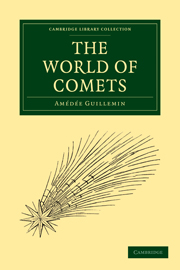Book contents
- Frontmatter
- EDITOR'S PREFACE
- PREFACE
- Contents
- LIST OF ILLUSTRATIONS
- CHAPTER I BELIEFS AND SUPERSTITIONS RELATIVE TO COMETS
- CHAPTER II COMETARY ASTRONOMY UP TO THE TIME OF NEWTON
- SECTION I COMETS AND THE ASTRONOMERS OF EGYPT AND CHALDEA
- SECTION II COMETARY ASTRONOMY IN THE TIME OF SENECA
- SECTION III COMETS DURING THE RENAISSANCE AND UP TO THE TIME OF NEWTON AND HALLEY
- SECTION IV NEWTON DISCOVERS THE TRUE NATURE OF COMETARY ORBITS
- CHAPTER III THE MOTIONS AND ORBITS OF COMETS
- CHAPTER IV PERIODICAL COMETS
- CHAPTER V PERIODICAL COMETS
- CHAPTER VI THE WORLD OF COMETS AND COMETARY SYSTEMS
- CHAPTER VII PHYSICAL AND CHEMICAL CONSTITUTION OF COMETS
- CHAPTER VIII PHYSICAL TRANSFORMATIONS OF COMETS
- CHAPTER IX MASS AND DENSITY OF COMETS
- CHAPTER X THE LIGHT OF COMETS
- CHAPTER XI THEORY OF COMETARY PHENOMENA
- CHAPTER XII COMETS AND SHOOTING STARS
- CHAPTER XIII COMETS AND THE EARTH
- CHAPTER XIV PHYSICAL INFLUENCES OF COMETS
- CHAPTER XV SOME QUESTIONS ABOUT COMETS
- I ELLIPTIC ELEMENTS OF THE RECOGNISED PERIODICAL COMETS OF THE SOLAR SYSTEM
- II GENERAL CATALOGUE OF THE ORBITS OF COMETS
- Plate section
SECTION I - COMETS AND THE ASTRONOMERS OF EGYPT AND CHALDEA
Published online by Cambridge University Press: 05 March 2012
- Frontmatter
- EDITOR'S PREFACE
- PREFACE
- Contents
- LIST OF ILLUSTRATIONS
- CHAPTER I BELIEFS AND SUPERSTITIONS RELATIVE TO COMETS
- CHAPTER II COMETARY ASTRONOMY UP TO THE TIME OF NEWTON
- SECTION I COMETS AND THE ASTRONOMERS OF EGYPT AND CHALDEA
- SECTION II COMETARY ASTRONOMY IN THE TIME OF SENECA
- SECTION III COMETS DURING THE RENAISSANCE AND UP TO THE TIME OF NEWTON AND HALLEY
- SECTION IV NEWTON DISCOVERS THE TRUE NATURE OF COMETARY ORBITS
- CHAPTER III THE MOTIONS AND ORBITS OF COMETS
- CHAPTER IV PERIODICAL COMETS
- CHAPTER V PERIODICAL COMETS
- CHAPTER VI THE WORLD OF COMETS AND COMETARY SYSTEMS
- CHAPTER VII PHYSICAL AND CHEMICAL CONSTITUTION OF COMETS
- CHAPTER VIII PHYSICAL TRANSFORMATIONS OF COMETS
- CHAPTER IX MASS AND DENSITY OF COMETS
- CHAPTER X THE LIGHT OF COMETS
- CHAPTER XI THEORY OF COMETARY PHENOMENA
- CHAPTER XII COMETS AND SHOOTING STARS
- CHAPTER XIII COMETS AND THE EARTH
- CHAPTER XIV PHYSICAL INFLUENCES OF COMETS
- CHAPTER XV SOME QUESTIONS ABOUT COMETS
- I ELLIPTIC ELEMENTS OF THE RECOGNISED PERIODICAL COMETS OF THE SOLAR SYSTEM
- II GENERAL CATALOGUE OF THE ORBITS OF COMETS
- Plate section
Summary
Had the Egyptians and Chaldeans any positive knowledge concerning cornets?– Apollonius of Myndus; the Pythagoreans considered comets to be true stars– According to Aristotle they are transient meteors ; fatal influence of the authority of this great philosopher upon the development of Cometary Astronomy.
Such is a very brief history of the errors into which the human mind–we should rather say the human imagination–. has fallen with respect to comets. We have now to show how little by little, and by very slow degrees, truth disengaged itself from error, and to supplement the history of superstitions and prejudices by that of science. Both are instructive and throw light upon each other at all stages of their mutual velopment. Thus, for example, we may readily conceive that the irregular movements of comets, their sudden and unforeseen apparition, to say nothing of the singularity of their aspect, for a long time precluded the idea of their being true stars, subjected to fixed laws, like the planets. Centuries of work, observation, and research were required for the discovery of the true system of the world as far as the sun, the planets, and the earth were concerned; but a difficulty of another kind stood in the way of the discovery of the true movements and nature of comets, since no trouble was taken to make exact and continuous observations of them.
- Type
- Chapter
- Information
- The World of Comets , pp. 35 - 41Publisher: Cambridge University PressPrint publication year: 2010First published in: 1877



